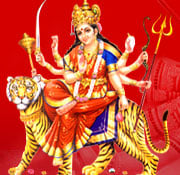Diwali is the Hindu Festival of Lights 
Diwali is a five-day long celebration and means as much to Hindus as Christmas does to Christians. Diwali signifies the renewal of life and heralds the beginning of winter – when sowing crops can start.
Diwali is also a Sikh festival, especially celebrating the release from prison of the sixth guru, Hargobind, in 1619. However, Sikhs had celebrated Diwali for many years before that. The foundation stone of the Golden Temple at Amritsar, the holiest place in the Sikh world, was laid on Diwali in 1577. For Jains, Diwali marks the attainment of Moksha (Nirvana, or eternal bliss) by the founder of Jainism, Lord Mahavira.
Find out more about Diwali.
guest |
October 16th, 2012
Navaratri, one of the greatest Hindu festivals, begins today. Navaratri means ‘nine nights’ in Sanskri. The celebration symbolises the triumph of good over evil and the festivities last for nine days. Navratri takes place at the beginning of October around harvest time.
Navaratri means ‘nine nights’ in Sanskri. The celebration symbolises the triumph of good over evil and the festivities last for nine days. Navratri takes place at the beginning of October around harvest time.
Most Hindus fast during Navaratri and only have a single meal during the day. Despite the fast, food is very important in Navaratri and there are many special Navaratri dishes such as banana chips and aloo raita. Fruits and dairy dishes are very popular, whereas non-vegetarian food is totally avoided during the celebrations. The internet offers several Navartri food and cooking guides. For this year’s Navaratri, India Today suggests a range of “mouth-watering twists” to tradition recipes, that will turn the “fast into a feast.”
Read more.. »
Today’s date marks the martyrdom of Guru Arjan Dev, the founder of the Sikh faith. Although many of us encounter Sikhism daily in the multicultural United Kingdom street scene, only a few know how Sikhism came to be. Today’s date is the perfect day to learn about it.

Guru Arjan Dev
Guru Arjan Dev was born in 1953. He believed that the meaning of life, and religion, was simply to live in this world and cope with everyday problems. One of his most famous quotes is “My faith is for the people of all castes and all creeds from whichever direction they come and to whichever direction they bow.” He announced this after creating the Sikhs their first central place of worship. The place for worship became known as the Golden Temple, although it was controversial in many ways. Guru Arjan Dev believed that humility is a great virtue, thus, he built the temple very low rather than tall and close to the sky as was the custom. Whats more, he ordered the temple to have entrances on all four sides. This was because Muslims believe God’s house is in the West, whereas Hindu’s believe it is in the East, and Guru Arjan Dev wanted his faith to accommodate everyone. To help raise money for the Golden Temple Guru Arjan Dev declared that Sikhs must donate 1/10 of their earnings to charity. This is still an important part of the Sikh fate today.
Read more.. »
The coming of Spring is celebrated in the Hindu religion over 
several days during the Festival of Colours – called Holi. Holi is a time for fun rather than religious observance. It is the most vibrant Indian festival, when distinctions of caste, class, age or gender are set to one side. The practical jokes and games that surround Holi are thought to arise from the belief that the origin of the festival lies with Krishna who was very mischievous as a young boy and threw coloured water over the gopis (milkmaids) with whom he is believed to have grown up.
Read more.. »



 Navaratri means ‘nine nights’ in Sanskri. The celebration symbolises the triumph of good over evil and the festivities last for nine days. Navratri takes place at the beginning of October around harvest time.
Navaratri means ‘nine nights’ in Sanskri. The celebration symbolises the triumph of good over evil and the festivities last for nine days. Navratri takes place at the beginning of October around harvest time.

 Hello, I'm Deborah Swallow and, for the last fifteen years, I've worked in over thirty countries addressing the complexities of people working internationally across multiple cultures, so individuals and organisations alike can gain an authentic competitive edge and win in international markets.
Hello, I'm Deborah Swallow and, for the last fifteen years, I've worked in over thirty countries addressing the complexities of people working internationally across multiple cultures, so individuals and organisations alike can gain an authentic competitive edge and win in international markets. 